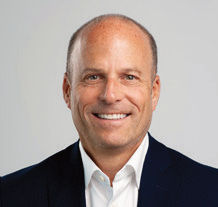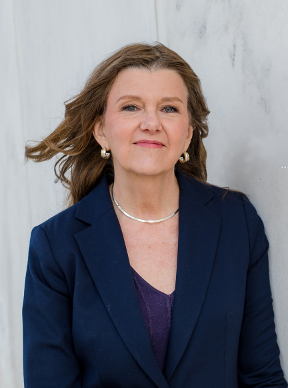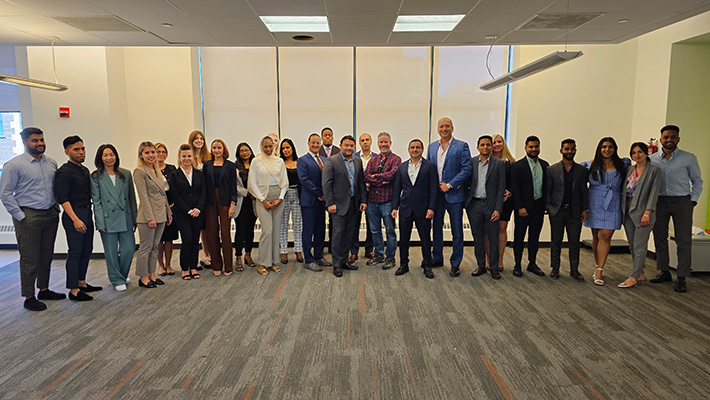Stories
Experts: How GFE Went Big
September 6, 2023The Brewster Building is an icon in Long Island City, a bustling district of Queens that’s right across the water from Manhattan. Most people know the building as the official headquarters of JetBlue because their giant logo on the roof can be seen from miles away. Others identify it as a major corporate hub for The Estée Lauder Companies since they sublease a substantial amount of office space inside. But up on the eighth floor, men and women traversing the hallways in suits work for another employer that’s making a splash in a different industry altogether. The sign on their door says GFE, which is short for Global Funding Experts. It’s a company that provides working capital to small businesses nationwide and they just recently secured a senior debt facility of up to $100 million.
Boris Musheyev, GFE’s CEO, founded the company almost a decade ago with partner Viacheslav “Steve” Eliyayev. Musheyev was working mainly in real estate when he learned about an innovative way to support small businesses by purchasing their future receivables. A cautious investor, he didn’t just jump right in. Instead, he bided his time with research on how it worked. He crunched numbers and analyzed the risks before he was confident it was something he wanted to do.
“From the outset, I’ve only channeled funds into ventures I wholeheartedly believed would both succeed and offer genuine value,” Musheyev told deBanked. “This commitment was evident in 2013 when we began by investing our capital.”
Alas, Global Funding Experts was born. The company’s model is referral partner driven, meaning they rely on ISOs for submissions and there’s no internal sales force. Today, GFE has an estimated 1,500 ISOs signed up and they receive about 700 applications on an average day. It’s a level of scale that wouldn’t be possible if they didn’t have an efficient CRM, something Musheyev predicted the necessity and utility of long before. GFE began building its own proprietary CRM in 2017 and the company used that to accelerate growth beyond its early startup days.
 With its momentum, GFE brought on Boris Shakhmurov to serve as COO in 2019, a traditional banking executive with 20 years experience. Shakhmurov was previously an Executive Director at JPMorgan Chase and had overseen mainly cybersecurity, technology controls, and compliance before making his move to GFE. The two Boris’s knew each other previously, having been friends for over 30 years already. At GFE, Shakhmurov’s pitch that “banks don’t lend to small businesses” lands differently given his background.
With its momentum, GFE brought on Boris Shakhmurov to serve as COO in 2019, a traditional banking executive with 20 years experience. Shakhmurov was previously an Executive Director at JPMorgan Chase and had overseen mainly cybersecurity, technology controls, and compliance before making his move to GFE. The two Boris’s knew each other previously, having been friends for over 30 years already. At GFE, Shakhmurov’s pitch that “banks don’t lend to small businesses” lands differently given his background.
“As an expert in Governance, Risk, and Compliance, when I joined the organization in 2019, our goal was to establish a best-in-class MCA Operational Resilience framework to address current and future challenges facing our industry,” Shakhmurov said. “With a focus on building strong and resilient operational controls, we used a multidisciplinary approach to assess the risk across all of our information assets and business processes. The Zero Trust and Defense-in-Depth approach enabled us to focus on early detection, rapid response, enhanced protection, and reducing single points of failure throughout the entire MCA lifecycle.”
For all the technical talk, Shakhmurov said what really stands out is the firm’s family-like atmosphere, which one can see for themselves in their spacious office. That environment has been achieved all while tightly controlling and compartmentalizing access to data, the company says. Security is paramount.

With the infrastructure in place, GFE hired Jonathan Mayer to be their CFO, a veteran accountant who previously spent more than 10 years at Grant Thornton LLP. Mayer first met Musheyev and Shakhmurov in 2021 and he echoed a similar sentiment about how he ended up at GFE. “The work ethic and trust and family environment really stood out to me,” Mayer said.
Between Musheyev, Eliyayev, Shakhmurov, and Mayer, the firm was then off to the races, ultimately leading up to the securing of a debt facility last month of up to $100 million. A lot went into making that happen, including the enlistment of a well known industry law firm to perform the due diligence, they say.
“Through consistent communication with our merchants and operational adaptability, we’ve not only met but surpassed our profitability benchmarks, all the while ensuring minimal defaults in our portfolio,” Musheyev said.
The company also credits having a qualified CFO and robust CRM technology as being necessary ingredients to getting a serious deal done. GFE’s signature products include purchases of future receivables, reverse consolidations, and more recently something called “Incremental Funding.” There’s also no commission clawbacks, they tout. Overall, GFE has funded over $400 million in capital to small businesses since inception.
The executive team heaped praise on the staff for being integral to their success.
“What we have is trust,” Shakhmurov said, who comes back again and again to the importance of building a business that will endure. “If you look at the banking industry, you need operational resilience,” he said.
6th Avenue Capital Secures $60 Million Commitment For Merchant Cash Advance Funding
November 2, 2017Highly Experienced Executive Team Offers Flexible Financing Options to Small Businesses
New York City – November 2, 2017 – 6th Avenue Capital, LLC (“6th Avenue Capital”), a leading provider of small business financing solutions, announced today its securement of a $60 million commitment from a large institutional investor. The investor made their commitment based on 6th Avenue Capital’s industry-leading underwriting, compliance standards and processes. 6th Avenue Capital will draw from this commitment to offer merchant cash advances to small businesses through its nationwide network of Independent Sales Organizations (“ISOs”) and other strategic partnerships, such as banks and small business associations.
6th Avenue Capital launched formal operations in 2016 to help finance small businesses that are often ineligible for funding due to traditional underwriting criteria. 6th Avenue Capital evaluates each application for funding individually and keeps the merchant’s short and long-term needs in mind including, most importantly, what they can afford. 6th Avenue Capital also understands that small businesses may need funding quickly. The company’s data-driven underwriting processes, expertise and technology can give the merchant secure and equitable approvals of qualified requests and funding within hours.
Leading the team, CEO Christine Chang oversees all strategic aspects of 6th Avenue Capital. She also serves as COO to sister company Nexlend Capital Management, LLC. She brings more than 20 years experience in institutional asset management, including alternative lending. Previously, Chang served as Chief Compliance Officer at Alternative Investment Management, LLC, COO at New York Private Bank & Trust and Vice President at Credit Suisse. She serves on the board of Blueprint Capital Advisors, LLC and Bottomless Closet, a not-for-profit empowering economic self-sufficiency in disadvantaged NYC women.
“Our mission at 6th Avenue Capital is to help small businesses grow, and we continue to expand our existing network of ISO and strategic partners to ensure these businesses have access to capital in hours,” said Chang. “Our leadership team of financial industry experts has extensive experience navigating multiple economic cycles. We know how to serve merchants and how to deliver quickly while meeting the highest operational standards for our investors.”
COO Darren Schulman joined the team in March 2017. Schulman is a 20-year veteran of the alternative finance and banking industries. He is responsible for oversight of 6th Avenue Capital’s origination, underwriting, operations and collections, as well as strategic initiatives. Schulman served previously as COO at Capify (formerly AmeriMerchant), a global small business financing company, and President and CFO at MRS Associates, a Business Process Outsourcing (BPO) company specializing in collections. In addition, Schulman was an Executive Vice President at MTB Bank.
“We form strong relationships with the merchant and consider it essential for our underwriters to speak to every merchant, on every deal, regardless of its size,” said Schulman. “We also make our underwriters available for discussions with ISOs whenever necessary. We are proud to offer competitive volume-based commissions, buyback rates and white label solutions.”
About 6th Avenue Capital, LLC
6th Avenue Capital is changing the small business financing landscape by offering a data-driven underwriting process and fast access to capital. The company employs a unique blend of industry experts and is committed to the highest operating standards, high touch merchant service, including a policy of direct merchant access to underwriters. 6th Avenue Capital is a sister company of Nexlend Capital Management, LLC, a fintech investment management firm founded in 2014 and focused on marketplace lending (consumer loans). For more information, visit www.6thavenuecapital.com.
# # #
Loan Brokers or Self Origination? Here’s What Experts Say
February 22, 2016 Last year belonged to the brokers in alternative finance — with a phone and a few leads pulled up online, anyone could sell a loan. With seemingly no barriers to entry, alternative lending attracted auto and insurance salesmen fleeing their jobs to cash in on the gold rush in an economy which was coming out of the shadows of distrust for big banks. And it found quick ascension to grow into a trillion dollar market.
Last year belonged to the brokers in alternative finance — with a phone and a few leads pulled up online, anyone could sell a loan. With seemingly no barriers to entry, alternative lending attracted auto and insurance salesmen fleeing their jobs to cash in on the gold rush in an economy which was coming out of the shadows of distrust for big banks. And it found quick ascension to grow into a trillion dollar market.
But a year on, as the dust has settled, we asked industry veterans what it means to remain successful in this business and what is the key to sustainability — is it in going for the ISO/broker channel to find deals or originating your own.
Here’s what they had to say
Don’t Break the Broker
Tom Abramov of MFS Global voted for the ISO/broker channel and said that that’s how the company strictly does deals, working with brokers who have a track record as a part of their recruitment system. The six year old company that started as an broker shop now focuses only on funding with products that are a mix of merchant cash advances and lines of credit.
“We don’t look at FICO scores or SIC codes, we only look at cash flows of businesses,” said Abramov. “I want to see if I give a someone a dollar whether they can turn it into two.”
Abramov added that his firm offers brokers 20 percent commission and their default rates are sub 5 percent.
The advantages of scoring deals through a broker channel can be alluring. It involves no overhead, no staff that needs compensation, motivation and incentives, and makes use of the existing broker-merchant relationships.
Jordan Feinstein of NuLook Capital said that his firm works with brokers exclusively and the model has helped them respond to merchants faster. “We do not have a sales team speaking to merchants directly, that’s in conflict with our model,” said Feinstein. “We decided that the best way to grow is to build relationships to avoid the overhead, compliance, training and manpower that a sales team would require,” he said.
Building a Hybrid Model
There are some others who want to make the best of both the models and work with brokers while originating and funding their own deals. Forward Financing which uses a hybrid model has strategic partnerships with some brokers while still originating their own deals. “We have a hybrid model because our goal is to have a program for any type of business and work with companies across the spectrum of risk,” said Justin Bakes, CEO of Forward Financing. “While our priority is to self originate, it is essential to create and maintain partnerships in this business,” he said.
The Original Origination
While the allure of a lean business is certainly attractive, there are some who are in the industry to build a bigger business and create value by making it robust — Jared Weitz of United Capital Source is one of them. “There is a big market for both analytical process as well as sales process. It’s important to go after your strength,” said Jared Weitz, founder and CEO of United Capital Source. “When you originate and fund your own deals, you’re in a rewarding position and in control of how merchants get treated.”
Industry Trends
Speaking of the industry in general, these experts agreed that the business was undergoing a change with new entrants coming in and experimenting with better services and technologies.
“Last year was the year of brokers but we are still missing the education with merchants. Some brokers are interested while some are not,” said Abramov.
“I notice a clear difference between the old and the new in terms of technology and pricing model,” said Bakes.
“New funders are coming in with different products and terms with increased competition in the ISO market,” said Feinstein.
“Marketing is getting more expensive and only the ones who can afford to pay can play,” said Weitz.
deBanked’s Top Five Stories of 2023
December 13, 2023 deBanked’s most read stories of 2023 are in. Here’s what the industry read about most this year!
deBanked’s most read stories of 2023 are in. Here’s what the industry read about most this year!
EIDL & ERC Updates
Readers tuned in to learn about EIDL loans going bad and the roller coaster surrounding the ERC program.
See:
As IRS Announces Pause of ERC Payouts, Businesses May Resume Pursuit of Upfront Alternatives
Whoa, That’s a Lot of Bad EIDL Loans
Reliant Funding
There was a lot of talk about Reliant Funding this year, which first made waves in February and then later in September.
See:
Reliant Funding Shifts Gears
The LCF Group Acquires Key Strategic Assets from Reliant Funding and Sets Course for a Record-Breaking Year
GFE
The company is called Global Funding Experts. After they raised a debt facility of $100 million, everyone wanted to know more!
See: Experts: How GFE Went Big
Bluevine Cutting off ISOs
The news just broke, but seeing a big name change their business strategy like this has got many people talking.
See: Bluevine Partner Email Circulates
Florida Commercial Financing Disclosure Rule
Guess what’s about to go into effect? A unique disclosure rule like nowhere else. Brokers, I hope you’ve read this one!
See: Pending Florida Law Draws From DailyFunder’s Rulebook
Top stories of 2022
Top stories of 2021
Top stories of 2020
Top stories of 2019
Top stories of 2018
Top stories of 2016
Why I’m An Evangelist…. For Outside Accounting Firms in MCA
November 9, 2023David Roitblat is the founder and CEO of Better Accounting Solutions, an accounting firm based in New York City, and a leading authority in specialized accounting for merchant cash advance companies. To connect with David or schedule a call about working with Better Accounting Solutions, email david@betteraccountingsolutions.com.
 For over a decade, since the explosion of the merchant cash advance industry in the United States, my team and I at Better Accounting Solutions have been working with a growing number of people and businesses involved in the industry, including brokers, funders, syndicators and investors. We’ve spent time meeting and mingling with you at industry events like Broker Fair and spent more hours talking on the phone advising you than we can bill for.
For over a decade, since the explosion of the merchant cash advance industry in the United States, my team and I at Better Accounting Solutions have been working with a growing number of people and businesses involved in the industry, including brokers, funders, syndicators and investors. We’ve spent time meeting and mingling with you at industry events like Broker Fair and spent more hours talking on the phone advising you than we can bill for.
All this experience has led me to one conclusion, one reinforced the longer we work together with many of you: to thrive and be successful in the merchant cash advance industry, you need a third-party independent financial expert embedded in your business and books.
To declare the obvious context and biases up front: yes, this benefits businesses like mine and yes, I know this from working with many of you. But people become knowledgeable and experts in their own field that they’ve spent years studying and developing, which is why I feel qualified to discuss this.
In the ever-evolving world of merchant cash advance and its challenging relationship with transparency and ethics, trust with your business partners is a must.
Having independent third-party financial experts that report to both parties-for example between a funder and their syndicators- is the only way to ensure complete transparency without bias or conflict. It eliminates the possibility of the funder misappropriating the syndicator’s investment and skimming off what the investors are owed. Firms like ours excel in tracking the numbers to see the deals that are working and the ones that aren’t, and can demonstrate what is trending down to stop a bad deal from spiraling into a company-killing problem.
People often choose to rely on a single in-house accountant to manage their books because they want exclusive focus, but there are plenty of downsides to that as well. Not only are accountants hired from another corporate job rarely equipped to accurately track deals in the complicated world of cash advance, but they are also incentivized to make their reports as favorable as they can to their own company, which may scare syndicators and investors whom they have no obligations to. By outsourcing these critical functions to a specialized firm, MCA funders send a clear message to investors and syndicators: they take financial accountability seriously and they are a trustworthy and transparent business to work with, with open books for their partners to peer in.
Industry scandals that bring our profession into disrepute- such as the collapses of MJ Capital Funding, LLC and 1 Global Capital– were able to happen because the investors pouring money into what they thought were legitimate MCA businesses weren’t given access to the companies books until it was too late and hundreds of millions of dollars were forever lost.
Obviously, you should be wise about people’s motives, even mine as the author of this article, but you should also take every piece of advice into consideration, particularly one that objectively suggests measures that fosters and promote trust and better business growth practices.
Remember, in the world of finance, trust is the most valuable asset of all.
NovoPayment, Latina-founded BaaS Plans to Expand
April 21, 2022 Novopayment has raised $19 million in Series A financing, led by Fuel Venture Capital and IDC Ventures. The company, which offers digital banking, payment, and card solutions, is planning to grow and expand within current and further US markets while focusing on countries in Latin America and the Caribbean.
Novopayment has raised $19 million in Series A financing, led by Fuel Venture Capital and IDC Ventures. The company, which offers digital banking, payment, and card solutions, is planning to grow and expand within current and further US markets while focusing on countries in Latin America and the Caribbean.
CEO and Co-founder Anabel Perez stated, “We define a digital payment as the simple transfer of value from one payment account to another using a digital service such as a mobile device, POS, or computer.”
With the new funding, NovoPayment plans to continue increasing capabilities, introduce new features and functionalities, heighten security, and capitalize on US market opportunities. To accelerate their expansion of current offices in Mexico, Colombia, Peru, Ecuador, and headquarters in Miami, they are adding over 100 new engineers, business development, and product experts to their team. Austin and San Francisco are the first two spots where the branching out will begin.
“Austin and San Francisco are huge hubs for tech innovation and we want to expand there to ensure we attract the best talent for our operations,” Perez discussed. “As we grow in those markets, we’ll assess if we need more boots on the ground in additional states.”
NovoPayment currently holds a strong placement in the LAC region and works with several US clients and partners. This places the company in the right position to broaden in these markets they already have successful track records in.
“Based on our ongoing discussions with clients, we have special insight into the challenges and technology gaps these markets face, and realize the potential to further connect the Americas with a common banking infrastructure. We will be growing our product offerings to enable new data and money flow solutions to account for the increasingly globalized, cloud-based world of financial services,” Perez explained.
As Miami is the “Latin America capital of the US,” NovoPayment holds an advantage as a native of South Florida with the tech scene gravitating towards this region. Miami has served as a gateway to other markets.
“Unlike other companies that are now playing catch up and rushing to the LatAm market, we have a strong foothold and reputation in 14 markets across the Americas,” said Perez. “Establishing those relationships, and understanding the nuances of each market, requires regional expertise that takes time to build.”
2019 Top 25 Executive Leaders in Lending – Canadian Lenders Association – Presented By BMO
November 11, 2019 The Canadian Lenders Assocation (CLA) received 124 nominations for these awards from leaders in lending across the country. The CLA’s goal is to support access to credit in the Canadian marketplace and champion the companies and entrepreneurs who are leading innovations in this industry.
The Canadian Lenders Assocation (CLA) received 124 nominations for these awards from leaders in lending across the country. The CLA’s goal is to support access to credit in the Canadian marketplace and champion the companies and entrepreneurs who are leading innovations in this industry.
The Top 25 finalists in this report represent various innovations in the borrower’s journey from innovations in artificial intelligence powered credit modelling to breakthroughs in consumer identity management using blockchain technologies. These finalists also represent solutions for a wide spectrum of borrower maturity and needs, ranging from consumer credit rebuilding all the way to senior debt placements for global technology ventures.
See The Leading Companies Report Here
See The Leading Executives Report Here
 |
Mark Cashin
CEO of myBrokerBee | Ontario After a career in commercial finance and being CEO of Transpor, Mark Co-founded myBrokerBee a mortgage broker platform that provides transparency to private lenders and their clients. |
 |
Avinash Chidambaram
CEO of Ario Platform | Ontario Through his experience as Product lead at Interac and Blackberry, Avinash has helped bring together an accomplished and talented group of experts in Data Science, Machine Learning, Security, Software Development to successfully develop this banking services software platform Ario. |
 |
Evan Chrapko
CEO of Trust Science | Alberta Evan is the founder and CEO of Trust Science, a leader in organizing alternative credit data. As a saas founder and CEO, Evan has done over 500mm in startup exits. |
 |
Kevin Clark
President of Lendified | Ontario Kevin is a recognized leader in the financial services industry with over 30 years of experience. Kevin has helped create the voice of Canada’s SME lending ecosystem through his leadership of Lendified and the CLA. |
 |
Jerome Dwight
VP of Cox Automotive | Ontario Jerome established Nextgear Capital in Canada to become the largest specialty finance company in the automotive sector. Jerome is a Globe & Mail 40 under 40 winner and previously lead RBC’s international wealth management, private banking and asset servicing business. |
 |
Saul Fine
CEO of Innovative Assessmer | Israel Saul is a licensed organizational psychologist and psychometrician, and a former lecturer in psychology at the University of Haifa. Saul is a global leader in the use of psychometric data for credit scoring and financial inclusion. |
 |
David Gens
CEO of Merchant Growth | BC David is the Founder and CEO of Merchant Growth, which grew from its humble beginnings in his apartment to offices in both Toronto and Vancouver. David now leads one of Canada’s largest online small business finance companies. |
 |
Bryan Jaskolka
COO of CMI | Ontario Nominated for the 2018 Mortgage Broker of the Year, Bryan Jaskolka is an expert in Canadian mortgage financing with a particular focus on the alternative lending space and mortgage investing. |
 |
Peter Kalen
CEO of Flexiti | Ontario Peter is a leader in Canada’s retail financing market. Before founding Flexiti, Peter was in senior leadership positions at Citi, PC Financial, and Sears Canada. Flexiti was recently named #7 on the Deloitte Fast50. |
 |
Yves-Gabriel Leboeuf
CEO of Flinks | Quebec Yves-Gabriel Leboeuf is the co-founder and CEO of Flinks. Under his leadership, Flinks has become a Canadian leader in banking data enablement. |
 |
Derek Manuge
CEO of Corl | Ontario Derek, also known as the “the quant from Canada” is the founder of the data-driven venture firm, Corl. Corl is one of Canada’s leaders in the use revenue-share financing models. |
 |
Keren Moynihan
CEO of Boss Insights | Ontario Keren Moynihan is co-founder and CEO of Boss Insights, a company that uses big data and AI to accelerate lending from months to minutes. With a Joint JD/MBA, Keren has a diverse background as a commercial banker, wealth manager and former founder of an impact startup. |
 |
Jason Mullins
CEO of Goeasy | Ontario Jason is President and CEO of goeasy, a publicly listed consumer lender. Jason has lead the company to become one of the largest and most innovative lenders in the country. |
 |
Paul Pitcher
CEO of SharpShooter Funding | Ontario After founding First Down Funding, an alternative lending firm for SMEs in Baltimore, Paul expanded his business to Canada through the subsidiary Sharpshooter Funding. |
 |
Brendan Playford & Cate Rung
Co-Founders of Pngme | USA Cate, ex-Uber and Brendan, a blockchain and agro-finance entrepreneur are the co-founders of Pngme, an alternative lending platform for financial institutions in emerging markets who serve Micro, Small, and Medium-sized Enterprises. |
 |
Wayne Pommen
CEO of Paybright | Ontario Wayne is the President and CEO of PayBright. Wayne is also a director of IOU Financial Inc and of HBC. Previously, Wayne was a Principal at TorQuest Partners, one of Canada’s leading private equity firms, and a management consultant with Bain & Company in the UK, the US, and Canada. |
 |
Adam Reeds
CEO of Ledn | Ontario Adam is a pioneer and thought leader in the digital asset backed lending space. Ledn is focused on building innovative financial products in the emerging digital asset space, with a focused mission to help people save more in bitcoin. |
 |
Adam Rice
CEO of LoanConnect | Ontario Adam has played a pivotal role in building one of the largest online markets in Canada for unsecured loans. |
 |
Mark Ruddock
CEO of BFS Capital | Ontario Mark is an experienced international CEO with two successful exits and over 20 years of experience at the helm of VC backed technology and fintech startups. In 2019 Mark announced BFS Capital’s expansion to Canada with a new 50 engineer data science hub in the heart of Toronto. |
 |
Vlad Sherbatov
President of Smarter Loans | Ontario Vlad Co-founded Smarter Loans in 2016 with the goal of helping Canadians make smarter financial decisions. Since then, Vlad has grown the platform into one of the go-to resources for Canadian borrowers. |
 |
Steven Uster
CEO of FundThrough | Ontario Steven is the Co-Founder & CEO of FundThrough, an invoice funding service that helps business owners eliminate “the wait” associated with payment terms by giving them the power and flexibility to get their invoices paid when they want, with one click, and in as little as 24 hours. |
 |
Dmitry Voronenko
CEO of Turnkey Lender| Singapore Dmitry, CEO and Co-founder of TurnKey Lender, holds a PhD in Artificial Intelligence. Dmitry was recently named SFA’s Fintech Leader of the year. |
 |
Neil Wechsler
CEO of Ondeck Canada | Quebec Neil briefly practiced law before becoming President and CEO of Optimal Group Inc. where he grew the company from a start-up to a leading NASDAQ-listed self-checkout and payments company. Neil later co-founded Evolocity, which in 2019 became OnDeck Canada. |
 |
Michael Wendland
CEO of Refresh | BC Michael has led Refresh Financial’s rapid growth since its founding in 2013, including a recent ranking of number 40 on Deloitte’s Fast 500. |
The Seven-Minute Loan Shakes Up Washington And The 50 States
August 19, 2018 It takes seven minutes for Kabbage to approve a small-business loan. “The reason there’s so little lag time,” says Sam Taussig, head of global policy at the Atlanta-based financial technology firm, “is that it’s all automated. Our marginal cost for loans is very low,” he explains, “because everything involving the intake of information – your name and address, know-your-customer, anti-money-laundering and anti-terrorism checks, analyzing three years of income statements, cash-flow analysis – is one-hundred-percent automated. There are no people involved unless red flags go off.”
It takes seven minutes for Kabbage to approve a small-business loan. “The reason there’s so little lag time,” says Sam Taussig, head of global policy at the Atlanta-based financial technology firm, “is that it’s all automated. Our marginal cost for loans is very low,” he explains, “because everything involving the intake of information – your name and address, know-your-customer, anti-money-laundering and anti-terrorism checks, analyzing three years of income statements, cash-flow analysis – is one-hundred-percent automated. There are no people involved unless red flags go off.”
One salient testament to Kabbage’s automation: Fully $1 billion of the $5 billion in loans that it has made to 145,000 discrete borrowers since it opened its portals in 2011 were made between 6 p.m. and 6 a.m.

Now compare that hair-trigger response time and 24-hour service for a small business loan of $1,000-$250,000 with what occurs at a typical bank. “Corporate credit underwriting requires 28 separate tasks to arrive at a decision,” William Phelan, president, and co‐founder of PayNet—a top provider of small-business credit data and analysis – testified recently to a Congressional subcommittee. “These 28 tasks involve (among other things): collecting information for the credit application, reviewing the financial information, data entry and calculations, industry analysis, evaluation of borrower capability, capacity (to repay), and valuation of collateral.”
A “time-series analysis,” the Skokie (Ill.)-based executive went on, found that it takes two-to-three weeks – and often as many as eight weeks—to complete the loan approval process. For this “single credit decision,” Phelan added, the services of three bank departments – relationship manager, credit analyst, and credit committee – are required.
The cost of such a labor-intensive operation? PayNet analysts reckoned that banks incur $4,000-$6,000 in underwriting expenses for each credit application. Phelan said, moreover, that credit underwriting typically includes a subsequent loan review, which consumes two days of effort and costs the bank an additional $1,000. “With these costs,” Phelan told lawmakers, “banks are unable to turn a profit unless the loan size exceeds $500,000.”
According to the National Bureau of Economic Research, the country’s very biggest banks — Bank of America, Citigroup, J.P. Morgan Chase, and Wells Fargo—have been the financial institutions most likely to shut down lending to small businesses. “While small business lending declined at all banks beginning in 2008,” NBER’s September, 2017 report announces, “the four largest banks” which the report dubs the ‘Top Four’—“cut back significantly relative to the rest of the banking sector.”
NBER reports further that by 2010—the “trough” of the financial crisis—the annual flow of loan originations from the Top Four stood at just 41% of its 2006 level, which compared with 66% of the pre-crisis level for all other banks. Moreover, small-business lending at the “Top Four” banks remained suppressed for several years afterward, “hovering” at roughly 50% of its pre crisis level through 2014. By contrast, such lending at the rest of the country’s banks eventually bounced back to nearly 80% of the pre-crisis level by 2014.

That pullback—by all banks—continues, says Kenneth Singleton, an economics professor at Stanford University’s Graduate School of Business. Echoing Phelan’s testimony, Singleton told deBanked in an interview: “Given the high underwriting costs, banks just chose not to make loans under $250,000,” which are the bread-and-butter of small-business loans. In so doing, he adds, banks “have created a vacuum for fintechs.”
All of which helps explain why Kabbage and other fintechs making small business loans are maintaining a strong growth trajectory. As a Federal Reserve report issued in June notes, the five most prominent fintech lenders to small businesses—OnDeck, Kabbage, Credibly, Square Capital, and PayPal—are on track to grow by an estimated 21.5 percent annually through 2021.
Their outsized growth is just one piece—albeit a major one—of fintech’s larger tapestry. Depending on how you define “financial technology,” there are anywhere from 1,400 to 2,000 fintechs operating in the U.S., experts say. Fintech companies are now engaged in online payments, consumer lending, savings and investment vehicles, insurance, and myriad other forms of financial services.
Fintechs’ advocates—a loose confederacy that includes not only industry practitioners but also investors, analysts, academics, and sympathetic government officials—assert that the U.S. fintech industry is nonetheless being blunted from realizing its full potential. If fintechs were allowed to “do their thing,” (as they said in the sixties) this cohort argues, a supercharged industry would bring “financial inclusion” to “unbanked” and “underbanked” populations in the U.S. By “democratizing access to capital,” as Kabbage’s Taussig puts it, harnessing technology would also re-energize the country’s small businesses, which creates the majority of net new jobs in the U.S., according to the U.S. Small Business Administration.
But standing in the way of both innovation and more robust economic growth, this cohort asserts, is a breathtakingly complex—and restrictive—regulatory system that dates back to the Civil War. “I do think we’re victims of our own success in that we’ve got a pretty good financial system and a pretty good regulatory structure where most people can make payments and the vast majority of people can get credit.” says Jo Ann Barefoot, chief executive at Barefoot Innovation Group in Washington, D.C. and a former senior fellow at Harvard’s Kennedy School. But because of that “there’s been more inertia and slower adoption of new technology,” she adds. “People in the U.S. are still going to bank branches more than people in the rest of the world.”

Barefoot adds: “There are five agencies directly overseeing financial services at the Federal level and another two dozen federal agencies” providing some measure of additional, if not duplicative oversight, over financial services. “But there’s no fintech licensing at the national level,” she says. And because each state also has a bank regulator, she notes, “if you’re a fintech innovator, you have to go state by state and spend millions of dollars and take years” to comply with a spool of red tape pertaining to nonbanks.
At the federal level, the current system— which includes the Federal Reserve, Office of the Comptroller of the Currency (OCC), and the Federal Deposit Insurance Corporation (FDIC)—developed over time in a piecemeal fashion, largely through legislative responses to economic panics, shocks and emergencies. “For historical reasons,” Barefoot remarks, “we have a lot of agencies” regulating financial services.
For exhibit A, look no further than the Consumer Financial Protection Bureau created amidst the shambles of the 2008-2009 financial crisis by the 2010 Dodd-Frank Act. Built ostensibly to preserve safety and soundness, the agencies have constructed a moat around the banking system.
Karen Shaw Petrou, managing partner at Federal Financial Analytics, a Washington, D.C. consultancy, is a banking policy expert who frequently provides testimony to Congress and regulatory agencies. She wrote recently that the country’s banking sector has been protected from the kind of technological disruption that has upended a whole bevy of industries.
“The only reason Amazon and its ilk may not do to banking, brokers and insurers what they did to retailers—and are about to do to grocers and pharmacies,” she observed recently in a blog—“is the regulatory structure of each of these businesses. If and how it changes are the most critical strategic factors now facing finance.”

Cornelius Hurley, a Boston University law professor and executive director of the Online Lending Policy Institute, is especially critical of the 50-state, dual banking system. State bank regulators oversee 75 percent of the country’s banks and are the primary regulators of nonbank financial technology companies. “The U.S. is falling behind other countries that are much less balkanized,” Hurley says. “Our federal system of government has served us well in many areas in our becoming a leading civil society. It’s given us NOW (Negotiable Order of Withdrawal) accounts, money-market accounts, automatic teller machines, and interstate banking. But now it’s outlived its usefulness and has become an impediment.”
Take Kabbage, which actually avoids a lot of regulatory rigmarole by virtue of its partnership with Celtic Bank, a Utah-chartered industrial bank. The association with a regulated state bank essentially provides Kabbage with a passport to conduct business across state lines. Nonetheless, Kabbage has multiple, incessant, and confusing dealings with its bank overseers in the 50 states.
“Where the states get involved,” says Taussig, “is on brokering, solicitation, disclosure and privacy. We run into varying degrees of state legislative issues that make it hard to do business. Right now we’re plagued by what’s been happening with national technology actors on cybersecurity breaches and breach disclosures. We are required to notify customers. But some states require that we do it in as few as 36 hours, and in others it’s a couple of months. We’ve lobbied for a national breach law of four days,” he adds, which would “make it easier for everyone operating across the country.”
Then there’s the meaning of “What is a broker?’” says Taussig, who as a regulatory compliance expert at Kabbage sees his role as something of an emissary and educator to regulators and politicians, the news media, and the public. “The definitions haven’t been updated since the 1950s and now we have wildly different interpretations of brokering and solicitation,” he says. “The landscape has changed with e-commerce and each state has a different perspective of what’s kosher on the Internet.”

Washington State is a good example. It’s one of a handful of jurisdictions in which regulators confine nonbank fintechs to making consumer loans. In a kabuki dance, fintech companies apply for a consumer-lending license and then ask for a special dispensation to do small-business lending.
And let’s not forget New Mexico, Nevada and Vermont where a physical “brick-and-mortar” presence is required for a lender to do business. Digital companies, Taussig says, would have to seek a waiver from regulators in those states. “Many companies spend a lot of money on billable hours for local lawyers to comply with policies and procedures,” Taussig reports, “and it doesn’t serve to protect customers. It’s really just revenue extraction.”
All such restraints put fintechs at a disadvantage to traditional financial institutions, which by virtue of a bank charter, enjoy laws guaranteeing parity between state-chartered and federally chartered national banks. The banks are therefore able to traverse state lines seamlessly to take deposits, make loans, and engage in other lines of business. In addition, fintechs’ cost of funds is far higher than banks, which pay depositors a meager interest rate. And banks have access to the Fed discount window, while their depositors’ savings and checking accounts are insured up to $200,000.
The result is a higher cost of funds for fintechs, which principally depend on venture capital, private equity, securitization and debt financing as well as retained earnings. And that translates into steeper charges for small business borrowers. A fintech customer can easily pay an interest rate on a loan or line of credit that’s three to four times higher than, say, a bank loan backed by the U.S. Small Business Administration.
Kabbage, for example, reports that its average loan of roughly $10,000 typically carries an interest rate of 35%-36%. It’s credits are, of course, riskier than the banks’. The company does not report figures on loans denied, Taussig told deBanked, but Stanford’s Singleton says that the fintech industry’s denial rate is roughly 50 percent for small business loans. “Fintechs have higher costs of capital and they’re also facing moderate default rates,” notes Singleton. “They’re not enormous, but fintechs are dealing with a different segment. Small businesses have much more variability in cash flows, so lending could be riskier than larger, established companies.”
 Even so, venture capitalists continue to pour money into fintech start-ups. “I’ve gone to several conferences,” Singleton says, “and everywhere I turn I’m meeting people from a new fintech company. One of the striking things about this space,” he adds, “is that there are lot of aspiring start-ups attacking very specific, very narrow issues. Not all will survive, but someone will probably acquire them.”
Even so, venture capitalists continue to pour money into fintech start-ups. “I’ve gone to several conferences,” Singleton says, “and everywhere I turn I’m meeting people from a new fintech company. One of the striking things about this space,” he adds, “is that there are lot of aspiring start-ups attacking very specific, very narrow issues. Not all will survive, but someone will probably acquire them.”
Contrast that to the world of banking. Many banks are wholeheartedly embracing technology by collaborating with fintechs, acquiring start-ups with promising technology, or developing in-house solutions. Among the most impressive are super-regionals Fifth Third Bank ($142.2 billion), Regions Financial Corp. ($123.5 billion), and BBVA Compass ($69.6 billion), notes Miami-based bank consultant Charles Wendel. But many banks are content to cater to familiar customers and remain complacent. One result is that there’s been a steady diminution in the number of U.S. banks.
Over the past ten years, fully one-third of the country’s banks were swallowed whole in an acquisition, disappeared in a merger, failed, or otherwise closed their doors. There were 5,670 federally insured banks at the end of 2017, according to the Federal Deposit Insurance Corp., a 2,863-bank, 33.5% decrease from the 8,533 commercial banks operating in the U.S. in 2007.
It does appear that, to paraphrase an old expression, many banks “are going out of style.” In recent years there have been more banking industry deaths than births. Sixty-three banks have failed since 2013 through June while only 14 de novo banks have been launched. In Texas, which is known for having the most banks of any state in the country, only one newly minted bank debuted since 2009. (The Bank of Austin is the new kid on the Texas block, opening in a city known as a hotbed of technology with its “Silicon Hills.”)
One reason there’s so little enthusiasm among venture capitalists and other financial backers for investing in de novo banks is that regulators are known to be austere. “If you’re a company in the U.S.,” says Matt Burton, a founder of data analytics firm Orchard Platform Markets (which was recently acquired by Kabbage), “and you tell regulators that you want to grow by 100 percent a year – which is the scale you must grow at to get venture-capital funding – regulators will freak out. Bank regulators are very, very strict. That’s why you never hear about new banks achieving any sort of scale.”
But while bank regulators “are moving sluggishly compared to the rest of the world” in adapting to the fintech revolution, says Singleton, there are numerous signs that the status quo may be in for a surprising jolt. The Treasury Department is about to issue (possibly by the time this story is published) a major report recommending an across-the-board overhaul in the regulatory stance toward all nonbank financials, including fintechs. According to a report in The American Banker, Craig Phillips, counselor to Treasury Secretary Steven Mnuchin, told a trade group that the report would address regulatory shortcomings and especially “regulatory asymmetries” between fintech firms and regulated financial institutions.

Christopher Cole, senior regulatory counsel at the Independent Community Bankers Association—a Washington, D.C. trade association representing the country’s Main Street bankers—told deBanked that, among other things, the Treasury report would likely recommend “regulatory sandboxes.” (A regulatory sandbox allows businesses to experiment with innovative products, services, and business models in the marketplace, usually for a specified period of time.)
That’s an idea that fintech proponents have been drumming enthusiastically since it was pioneered in the U.K. a few years ago, and it’s something that the independent bankers’ lobby, whose member banks are among the most threatened by fintech small-business lenders, says it too can support. Treasury’s Phillips “has said in the past that he’d like to see a level playing field,” the ICBA’s Cole says. “So if (regulators) are going to allow a sandbox, any company could be involved, including a community bank. We agree with him, of course, because we’d like to take advantage of that.”
In March, 2018, Arizona became the first state to establish a regulatory sandbox when the governor signed a law directing that state’s attorney general (and not the state’s banking regulator) to oversee the program. The agency will begin taking applications in August with approval in 90 days, says Paul Watkins, civil litigation chief in the AG’s office. Watkins told deBanked that he’s been most surprised so far by “the degree of enthusiasm” from overseas companies. With the advent of the sandbox, he adds, “Landlocked Arizona has become a port state.”
 The OCC, which is part of the Treasury Department, may also revive its plan to issue a national bank charter to fintechs, sources say (EDITOR’S NOTE: This had not yet been implemented before this story went to print. The OCC is now accepting such applications) – a hugely controversial proposal that was put on ice last year (and some thought left for dead) when former Commissioner Thomas J. Curry’s tenure ended last spring. At his departure, the fintech bank charter faced a lawsuit filed by both the New York State Banking Department and the Conference of State Bank Supervisors. (Since then, the lawsuit was tossed out by the courts on the ground that the case was not “ripe” – that is, it was too soon for plaintiffs to show injury).
The OCC, which is part of the Treasury Department, may also revive its plan to issue a national bank charter to fintechs, sources say (EDITOR’S NOTE: This had not yet been implemented before this story went to print. The OCC is now accepting such applications) – a hugely controversial proposal that was put on ice last year (and some thought left for dead) when former Commissioner Thomas J. Curry’s tenure ended last spring. At his departure, the fintech bank charter faced a lawsuit filed by both the New York State Banking Department and the Conference of State Bank Supervisors. (Since then, the lawsuit was tossed out by the courts on the ground that the case was not “ripe” – that is, it was too soon for plaintiffs to show injury).
Taussig, the regulatory expert at Kabbage, reports that the Comptroller of the Currency, Robert J. Otting, has promised “a thumbs-up or thumbs-down” decision by the end of July or early August on issuing fintechs a national bank charter. He counts himself as “hopeful” that OCC’s decision will see both of the regulator’s thumbs pointing north.

The Conference of State Bank Supervisors, meanwhile, has extended an olive branch to the fintech community in the form of “Vision 2020.” CSBS touts the program as “an initiative to modernize state regulation of non-bank financial companies.” As part of Vision 2020, CSBS formed a 21-member “Fintech Industry Advisory Panel” with a recognizable roster of industry stalwarts: small business lenders Kabbage and OnDeck Capital are on board, as are consumer lenders like Funding Circle, LendUp and SoFi Lending Corp. The panel also boasts such heavyweights in payments as Amazon and Microsoft.
Working closely with the fintech industry is a “key component” of Vision 2020, Margaret Liu, deputy general counsel at CSBS, told deBanked in a recent telephone interview. CSBS and the fintech industry are “having a dialogue,” she says, “and we’re asking industry to work together (with us) and bring us a handful of top recommendations on what states can do to improve regulation of nonbanks in licensing, regulations, and examinations.
“We want to know,” she added, ‘What the main friction points are so that we can find a path forward. We want to hear their concerns and talk about pain points. We want them to know the states are not deaf and blind to their concerns.”
Global Funding Experts NEW PROGRAMS... my name is lior e. and i work as an iso rep for global funding experts. our new programs are now paying 12 points! long-term position at 1.299 sell ... |

See Post... global funding experts (reverse), , lendini, everest, vital, fundworks, total merchant resc, , river, cfg, slate advance, velocity, , ysc, last chance, bitty, cooper, , bluevine, , you should try giving us (clearfund) a shot at yo... |
Lenders/Funders List! Who am I missing?... global funding experts (reverse), , lendini, everest, vital, fundworks, total merchant resc, , river, cfg, slate advance, velocity, , ysc, last chance, bitty, cooper, , bluevine... |
See Post... global funding experts & cash village same underwriters... |






























